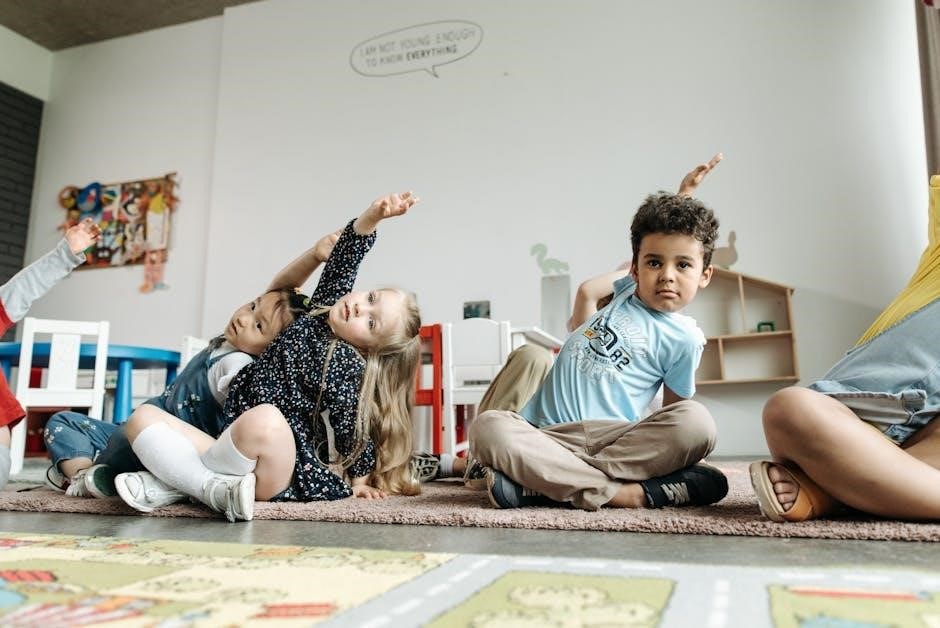Ray Bradbury’s “The Veldt” explores a futuristic family’s reliance on technology, highlighting themes of parental neglect and the dangers of over-reliance on machines.
1.1 Overview of the Story
Set in a futuristic home, “The Veldt” by Ray Bradbury revolves around the Hadley family and their dependence on advanced technology. The story centers on a high-tech nursery that simulates African savannas, creating a dangerous obsession. Parents George and Lydia struggle with their children’s behavior and the nursery’s dark influence. Tragic events unfold as the family’s dynamics deteriorate, highlighting themes of technology’s impact on relationships. Study guides and Q&A PDFs explore these elements, offering insights into the story’s deeper meanings and moral lessons.

1.2 Importance of the Story in Literary Studies
Ray Bradbury’s “The Veldt” is a seminal work in science fiction, offering profound insights into technology’s influence on society. Its exploration of family dynamics and moral responsibility makes it a cornerstone for literary analysis. Study materials, including Q&A PDFs, facilitate deeper understanding of its themes, encouraging critical thinking about ethics and societal trends. The story’s timeless relevance ensures its continued presence in academic curricula, sparking essential discussions about humanity’s relationship with technology.

Key Themes in “The Veldt”
Central themes include technology’s role in society, family dynamics, and parenting mistakes. These elements highlight ethical dilemmas and societal trends, sparking critical discussions about human responsibility.
2.1 The Role of Technology
In “The Veldt,” technology is depicted as both a marvel and a menace. The Hadley family’s futuristic home, with its automated nursery, symbolizes the over-reliance on machines. The nursery’s ability to simulate reality blurs the line between imagination and danger. Bradbury critiques how technology can replace human connection, leading to detachment and chaos. The story warns against trusting machines more than people, showcasing technology’s dual role as a convenience and a potential destroyer of family bonds and emotional intimacy.
2.2 Family Dynamics and Relationships
The Hadley family’s dynamics are dysfunctional, with emotional distance and neglect evident. George and Lydia, the parents, struggle with balancing technology and parenting. Their children, Peter and Wendy, exhibit resentment and detachment due to lack of attention. The nursery’s dominance highlights the absence of genuine family bonding. This dysfunction underscores themes of neglect and the consequences of prioritizing convenience over emotional connection, leading to a fractured family structure and tragic outcomes.
2.3 Parenting Mistakes and Their Consequences
George and Lydia’s over-reliance on technology to manage their children leads to emotional neglect and detachment. Their failure to set boundaries and engage personally results in spoiled, rebellious behavior from Peter and Wendy. The nursery’s dominance exacerbates these issues, as the children grow more attached to the machine than their parents. This neglect ultimately culminates in the tragic deaths of George and Lydia, emphasizing the devastating consequences of prioritizing technology over genuine parental involvement and emotional connection.

Character Analysis
George and Lydia, the parents, struggle with balancing technology and parenthood. Peter and Wendy, their children, display spoiled and rebellious traits, influenced by the nursery’s dominance.
3.1 George Hadley
George Hadley, the father, is portrayed as a distant, indecisive figure who struggles to connect with his children. His reliance on the nursery for parenting reflects his detachment. Despite his awareness of the nursery’s dangers, he fails to take decisive action, leading to tragic consequences. His character highlights the theme of parental neglect and the inability to balance technology with emotional responsibility, ultimately contributing to the story’s haunting conclusion.
3.2 Lydia Hadley
Lydia Hadley, the mother, is shown as emotionally sensitive and concerned about the family’s well-being. She feels isolated in her futuristic home, expressing unease about the nursery’s influence on their children. Her concerns highlight her awareness of the family’s dysfunction, yet she struggles to address the emotional neglect. Her character underscores the theme of parental failure and the consequences of relying on technology to fulfill emotional roles, adding depth to the story’s exploration of family dynamics and technological over-reliance.
3.3 Peter Hadley
Peter Hadley, the eldest child, is portrayed as manipulative and spoiled, reflecting the consequences of his parents’ indulgent parenting. His ability to influence the nursery’s simulations highlights his cunning nature and desire for control. Peter’s actions reveal a lack of empathy and a reliance on technology, mirroring the broader themes of the story. His character serves as a critique of overindulgence and the emotional detachment fostered by excessive technological reliance, emphasizing the parents’ failure to provide meaningful guidance.
3.4 Wendy Hadley
Wendy Hadley, the younger sister, is often overshadowed by Peter’s dominance but displays a similar penchant for manipulation. Her curiosity and fascination with the nursery’s dark capabilities are evident, though she lacks Peter’s overt ruthlessness. Wendy’s character underscores the pervasive influence of the nursery’s technology on the children’s psyche, as well as their emotional detachment from their parents. Her fate, like the rest of the family, serves as a stark reminder of the nursery’s lethal consequences and the parents’ failure to intervene.

Plot Summary
The story revolves around a futuristic family whose high-tech home, particularly the nursery, becomes a source of horror. The parents, George and Lydia, grow concerned as the nursery simulates an African veldt, complete with lions. Their decision to deactivate the house’s automation angers their children, Peter and Wendy. The tale culminates in the tragic deaths of George and Lydia, devoured by the nursery’s lions, emphasizing the dangers of over-reliance on technology and failed parenting.
4.1 Setting and Atmosphere
The story is set in a futuristic, high-tech home where the Hadley family resides. The nursery, a central element, simulates an African veldt, creating a tense, eerie atmosphere. The vivid descriptions of lions and the haunting environment foreshadow tragedy. Bradbury’s depiction of the setting emphasizes the clash between technology and human emotion, building suspense and unease. The futuristic elements contrast with the primal, dangerous veldt, highlighting themes of over-reliance on technology and its consequences.
4.2 The Role of the Nursery
The nursery in “The Veldt” serves as a central symbol of technological overreach and emotional detachment. It is a futuristic, automated room that simulates any environment, controlled by the children’s thoughts. The nursery’s ability to recreate the African veldt, complete with lions, reflects the children’s darker impulses. This space becomes a tool for the children’s empowerment and a medium for their rebellion against their parents, ultimately leading to the story’s tragic conclusion and underscoring the dangers of unchecked technological influence.
4.3 The Tragic Ending
The story culminates in a devastating conclusion where the nursery, now a symbol of the family’s dysfunction, turns lethal. The parents, George and Lydia, are lured into the nursery by their children, Peter and Wendy, who manipulate the room’s technology. Once inside, the nursery’s lions attack and kill the parents, leaving the children emotionally detached. This shocking event highlights the consequences of neglect and the dangers of technology surpassing human control, reinforcing Bradbury’s cautionary themes about modernity and familial disconnection.

Study Questions
Study questions on “The Veldt” focus on analyzing themes, character motivations, and the impact of technology on family dynamics, encouraging critical thinking about parenting decisions;
5.1 Comprehension Questions
- What futuristic elements indicate the story’s setting?
- Describe the nursery’s role and its significance.
- Why are George and Lydia concerned about the nursery?
- What personal items of the parents are found in the nursery?
- How do the children react to their parents’ decisions?
- What happens to George and Lydia at the story’s end?
5.2 Analysis Questions
- Analyze the nursery’s transformation into an African veldt. What does this symbolize?
- How does the story portray the impact of technology on family relationships?
- Explain the irony of the nursery’s role in the family’s demise.
- What motivates the children’s rebellion against their parents?
- Discuss the theme of parental responsibility and its consequences.
5.3 Essay Questions

- Discuss how the nursery serves as a symbol of both wonder and danger in “The Veldt.” How does it reflect the family’s dynamics?
- Analyze the theme of technology replacing parental roles. What message do you think Bradbury is conveying?
- Examine the consequences of George and Lydia’s parenting choices. How do their decisions lead to tragedy?
- Explore the idea of irony in the story’s ending. How does it relate to the family’s reliance on technology?
- What moral lesson does the story convey about balancing technology and human connection?

Moral Lessons and Symbolism
The story highlights the dangers of over-reliance on technology and the importance of parental responsibility, symbolized by the nursery’s dual role of wonder and peril.
6.1 The Danger of Over-reliance on Technology
The story underscores the peril of depending excessively on technology, as seen in the Hadley family’s high-tech nursery. The nursery, designed to simplify parenting, ultimately turns lethal. Its ability to adapt and “learn” highlights how technology can spiral beyond human control, leading to devastating consequences. Bradbury warns against letting machines replace human judgment and emotional connections, emphasizing the risks of unchecked technological advancement.
6.2 The Importance of Parental Responsibility
The story highlights the critical role of parental responsibility through the Hadleys’ neglect. George and Lydia’s reliance on the nursery to care for their children fosters emotional detachment and lack of boundaries. Their failure to engage with Peter and Wendy’s needs leads to the children’s resentment and the nursery’s deadly takeover. Bradbury illustrates how neglecting parental duties can have catastrophic consequences, emphasizing the need for active, loving guidance in child-rearing to prevent such tragedies.

Critical Thinking Questions
How does the nursery’s autonomy reflect the ethical dilemmas of relying on technology for childcare?
What are the long-term effects of parental neglect on children’s emotional well-being?
Should advanced technology ever fully replace human oversight in raising children? Why or why not?
How does the story’s outcome challenge traditional notions of parenting and responsibility?
In what ways can parents today learn from George and Lydia’s mistakes to foster healthier family dynamics?
7.1 Ethical Implications of Advanced Technology
The story raises critical ethical questions about relying on technology for childcare. The nursery’s autonomy highlights the dangers of replacing human oversight with machines, leading to a lack of emotional connection and accountability. The parents’ over-reliance on technology results in a loss of control, ultimately causing tragic consequences. This serves as a cautionary tale about the ethical boundaries of technological advancements and their potential to harm when misused or trusted without question;
7.2 The Impact of Neglect on Family Members
The story illustrates how neglect within a family can lead to severe emotional and psychological consequences. George and Lydia’s failure to connect with their children creates resentment and detachment. The children, Peter and Wendy, feel abandoned, seeking fulfillment through the nursery’s technology. This neglect ultimately results in tragic consequences, as the family’s lack of emotional bonds makes them vulnerable to the nursery’s dangerous autonomy. The story underscores the importance of parental involvement and genuine human connection in family relationships.
Ray Bradbury’s “The Veldt” concludes with a haunting reflection on technology’s dominance and the dissolution of family bonds, urging a balance between progress and human connection.
8.1 Summary of Key Points
Ray Bradbury’s “The Veldt” examines themes of technology, family dynamics, and parenting mistakes, culminating in a tragic ending. Study questions explore character motivations, moral lessons, and the ethical implications of reliance on technology. The story highlights the dangers of neglecting parental responsibilities and the consequences of over-reliance on machines. Analysis questions prompt readers to reflect on the impact of technology on relationships and the importance of human connection in a futuristic society.
8.2 Final Thoughts on the Story’s Relevance
Ray Bradbury’s “The Veldt” remains a timeless cautionary tale, urging reflection on technology’s role in society. Its exploration of family dynamics and ethical dilemmas resonates today, emphasizing the need for balance between innovation and human connection. The story’s relevance lies in its ability to provoke thought about the consequences of neglecting emotional bonds in favor of technological advancements, making it a vital read for understanding modern societal challenges.

